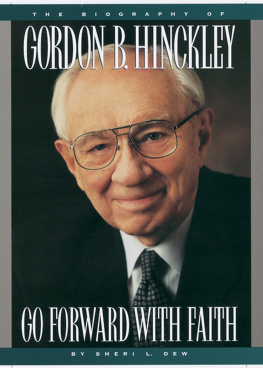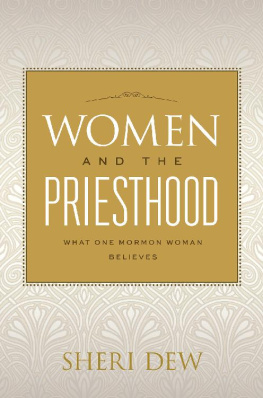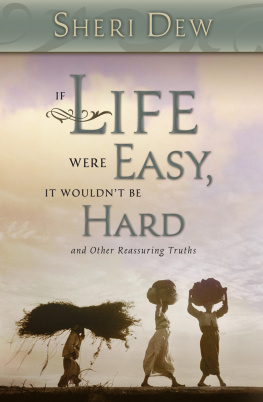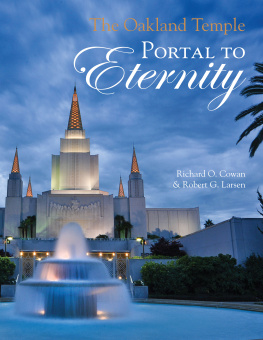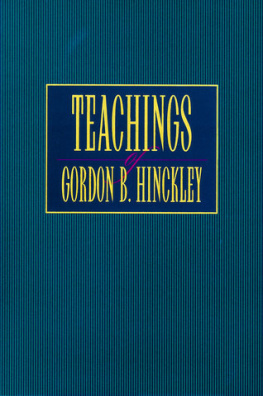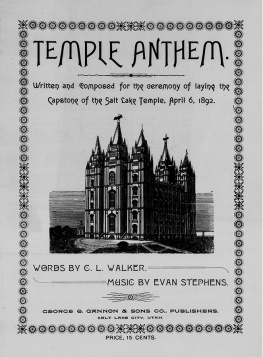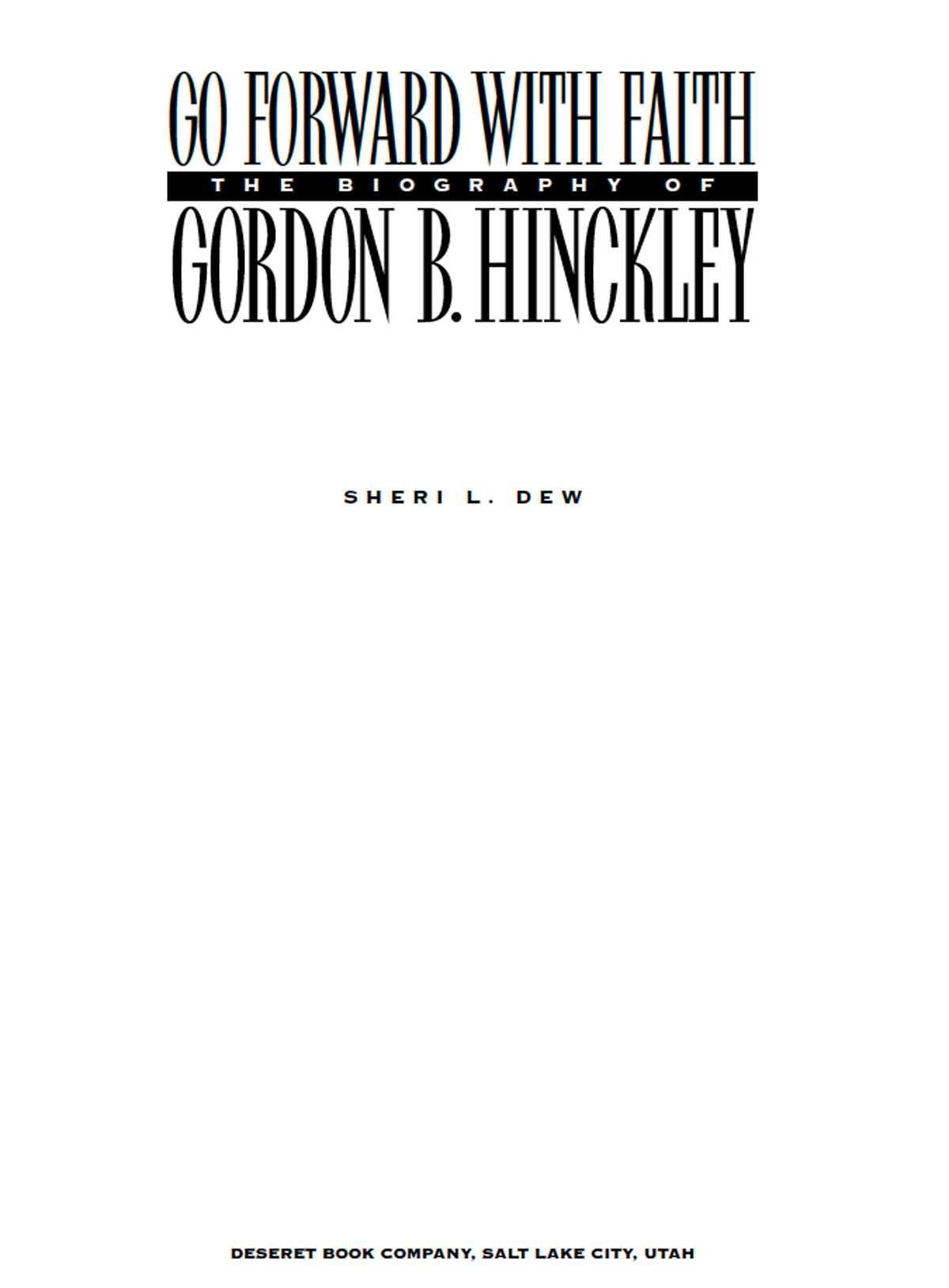1996 Sheri L. Dew.
All rights reserved. No part of this book may be reproduced in any form or by any means without permission in writing from the publisher, Deseret Book Company, P.O. Box 30178, Salt Lake City Utah 30178. This work is not an official publication of The Church of Jesus Christ of Latter-day Saints. The views expressed herein are the responsibility of the author and do not necessarily represent the position of the Church or of Deseret Book. Deseret Book is a registered trademark of Deseret Book Company.
Preface
It will come as no surprise to anyone who knows President Gordon B. Hinckley to learn that he was the last person who wanted to see this book written. For years he resisted the urging of colleagues and family members and dodged various publishers who tried to persuade him to have his life story committed to writing. And though he nally relented and agreed to cooperate with this project, he clearly would have preferred to let his story remain essentially untold.
There are several reasons for his reticence, one of them being that he has no taste for notoriety and absolutely no need for everyone to know what he has accomplished during six decades of Church and civic service. For another, the prospect of being the subject of a literary portrait that might paint him as more than he considers himself to be has been unappealing if not painful. You cant get a dollar bill out of fifteen cents, he has said to me more than once. Ill never forget meeting with him after he had read the first third of the manuscript. After an uncomfortable pause, during which it seemed he was searching for the words to let me down easily, he began: I am sick, sick, sick of reading about Gordon Hinckley. There is just too much about Gordon Hinckley in this manuscript. I groped for a response. Whom did you want me to write about in your biography? came to mind, but I couldnt think of a respectful way to phrase the question so I remained silent.
Then I had my first exposure to a mini-sermon he would repeat at least a dozen times during succeeding months. Adulation is poison, he said, emphasizing each word. Adulation has ruined many a good man and woman, and I dont want this book to portray me as something Im not. I nally replied: President, I can see that we have just one small problem here. You want me to write a book that says you are just a common, ordinary man. Well, I am, he interrupted. I was just a normal little boy who played marbles and got in fistfights and dipped the pigtails of the girl who sat in front of me in the inkwell on my desk. I have done nothing more than try to do what has been asked of me, and Ive tried to do it the best I could. I dont want you to make more out of my life than is there.
So herein lay the challenge. My subject did not want to be depicted as larger than life, yet it was clear from the outset that I was dealing with a man who was anything but ordinary. George W. Durham II, the son of Elder G. Homer Durham, whose friendship with President Hinckley dated to boyhood, summarized it best when he said to me: I dont envy you. Youve been asked to write a portrait, but youre dealing with a landscape. I cant imagine how youll pull it off. It was a sobering statement.
Here and there, and now and then, God places a giant among men, a poet once said. How much more remarkable when that giant doesnt see himself as such, which is the case with President Hinckley. Try as I might, and search as I have, I have found nothing to support his claim that he is a common, ordinary man. Certainly he has experienced the challenges of mortality. He has laughed and cried, endured heartache and experienced triumph, made mistakes and worked to correct them. He has also kept a feverish pace, maintained his composure under fire, tackled head-on one intimidating assignment after another, and in general followed a simple maxim that he has preached all his lifethat the only way to get anything done is to get on your knees and ask for the Lords help, and then get to your feet and go to work.
It was John Ruskin who said that the greatest reward is not what we receive for our labor, but what we become by it. If there was ever a living example of that principle, it is President Hinckley. By the time he became President of the Church, he had labored nearly sixty years at Church headquarters, the first twenty-three of them in relative anonymity. But now, after thirty-eight years of service as a General Authority, and fteen of those in the First Presidency, his influence in such vital areas as missionary work, temple building and temple work, Church nance, and public affairs is well documented. His second counselor, President James E. Faust, has suggested that perhaps no man who has become President of the Church has been more extensively or better prepared for that office. Indeed, there is no hyperbole in stating that President Hinckley has inuenced the onward march of the gospel kingdom in a way paralleled by few others. And in the process, he has molded a life worthy of emulation.
In short, this is a man whose story deserves to be told. President Hinckley himself once said that the most persuasive gospel tract is the exemplary life of a Latter-day Saint. May I suggest that readers will find in this biography the story of a man whose life forms an unimpeachable gospel tract.
That is not to say that President Hinckley has proved an easy subject. He has seemed to me a study in contrasts. He is deeply spiritual, yet he doesnt wear his testimony on his sleeve. His colleagues insist that he is brilliant, but even more that he is pragmatic and savvy. His tremendous regard for the past connects him to the founders of this dispensation in an almost tangible way, yet he is bold, not hidebound by convention or even tradition, a pioneer in his own right who will venture into uncharted territory. He feels passionately about the gospel and about people, yet he isnt overly sentimental. He has a deep understanding of the scriptures and the doctrine of the Church, but he constructs his sermons such that they dont overpower or intimidate. He is tremendously articulate, but he uses language carefully and in a manner that doesnt call attention to itself. He takes what he does very seriously, but he doesnt take himself too seriouslyhence his often self-deprecating wit that appeals to people of all stations. It would be hard to identify someone who has more diligently defended the office of the President of the Church, yet he is uncomfortable having undue attention focused on himself now that he holds that office. And though he has great natural ability, he has not succumbed to the mortal tendency to glory in his own strength. His faith is squarely centered in a Power much greater than his own.
For all of his reluctance at allowing this project to proceed and herein is demonstrated yet another dichotomy as well as the immensity of his characterPresident Hinckley has been accessible and cooperative every step of the way. He has read various drafts of the manuscript and has offered suggestions and made corrections while allowing me the freedom to maintain the works integrity. I am grateful for his patience, his good humor, and his example. In addition, those who work in President Hinckleys ofce have been extremely helpful. I am particularly indebted to Lowell R. Hardy, his personal secretary, who has responded to countless requests and in doing so has contributed enormously to this project, and to Debbie Burnett, also of the Presidents ofce, who has furnished an unending supply of documents, transcripts, and other materials.

